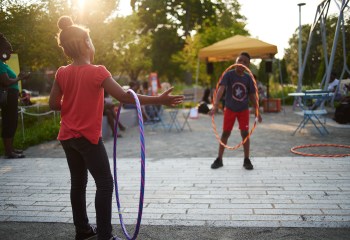ST. PAUL – (August 21, 2020) – A new landmark study finds access to quality job opportunities fosters greater connections to communities for residents, but in St. Paul more needs to be done to improve access to jobs along race and socioeconomic lines.
Commissioned by the Knight Foundation and conducted by the Urban Institute, “Community Ties: Understanding what attaches people to the place where they live,” revealed that access to jobs, recreational spaces and other urban amenities increase residents’ feelings of attachment to their communities and their likelihood of investing time and resources in them. But in St. Paul, the data showed that an access gap exists for communities of color and low-income residents to quality jobs and other urban amenities.
Some of the key findings include:
- In St. Paul, the study shows that 73% of residents say quality job opportunities are very important to them, and 82% feel they are easy to access. But there is also a racial disparity: Among residents of color, 73% feel they have easy access to quality job opportunities versus 85% of white residents. This is much wider than the national gap of 60% versus 65% respectively.
- Likewise, 79% of St. Paul residents say safe places to live, work and play are very important to them and 85% report easy access to them. However, only 70% of residents of color reported easy access versus 89% of white residents.This represents a deeper divide than the national average (69% versus 83%) and highlights an issue that must be addressed.
Jai Winston, director of Knight’s St. Paul program, said the city has seen steady job growth since the Great Recession before the pandemic changed everything. In fact, St. Paul’s Metropolitan Council released a pre-COVID-19 forecast that projected a new high in jobs in 2020; providing an opportunity for downtown to play an important role in contributing to the growth of jobs.
“Community Ties reminds us of the importance of job opportunities – some of which are concentrated in downtown St. Paul – to tie residents to the city because those opportunities offer good wages and health benefits. But they remain harder to access, especially for residents of color, who are integral to a thriving community,” Winston said. “The findings challenge all of us in St. Paul to remain steadfast in our work to collectively create a revitalized city center where entrepreneurship can thrive and more offer job opportunities.”
Conducted prior to the coronavirus shutdowns, Community Ties leverages a survey of over 11,000 Americans residing in metro areas across the country — including St. Paul — to create one of the richest datasets on what drives attachment to place.
- Those with access to quality of life amenities such as arts, recreational areas and safe places to live, work and play reported a deeper attachment to their community, compared with those who had access to jobs, affordable housing, schools, health care or other desirable features.
- The St. Paul data reveals how attached local residents are to the city and where gaps in access exist across urban amenities. It offers points of consideration for such leaders such as — boosting time in center city, focusing on quality of life, paying attention to issues of equity — to strengthen residents’ ties to their communities.
As cities plan for a post-COVID-19 world and reckon with racial justice, the report provides knowledge for public officials and other community leaders to help make cities more resilient, urban public spaces more equitable, and think anew about how to build places where people want to live, work, play and stay.
To see how your city compares in different areas with other Knight communities and the national averages, go to our interactive website.
For interviews, please contact Alexa Lamanna at [email protected] or (202) 320-2766.
###
About the John S. and James L. Knight Foundation
Knight Foundation is a national foundation with strong local roots. We invest in journalism, in the arts, and in the success of cities where brothers John S. and James L. Knight once published newspapers. Our goal is to foster informed and engaged communities, which we believe are essential for a healthy democracy. For more, visit kf.org.
About Urban Institute
The nonprofit Urban Institute is a leading research organization dedicated to developing evidence-based insights that improve people’s lives and strengthen communities. For 50 years, Urban has been the trusted source for rigorous analysis of complex social and economic issues; strategic advice to policymakers, philanthropists and practitioners; and new, promising ideas that expand opportunities for all. Our work inspires effective decisions that advance fairness and enhance the well-being of people and places.
Image (top) by Shridhar Gupta on Unsplash.








